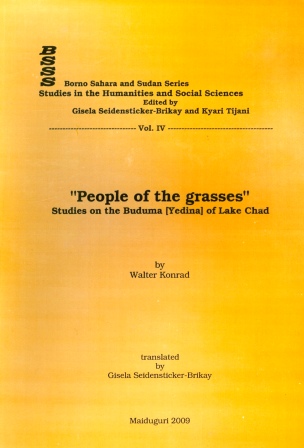
“People of the Grasses”
Studies on the Buduma [Yedina] of Lake Chad
Author: Walter Konrad †. Translated by: Gisela Seidensticker-Brikay †. With contributions by: Catherine Baroin. Series edited by: Gisela Seidensticker-Brikay †, Kyari Tijani †.
Series: BSSS Borno Sahara and Sudan Series Volume 4
201014 pp. Roman, 249 pp.
5 maps, 25 b/w photos, 5 sketches, index
Format: 153 x 241 mm
320 g
Paperback
€ 39.80
Order '“People of the Grasses”' as print edition »
With volume IV of the Borno Sahara and Sudan Series, a series of ethnographic articles that Walter Konrad published in the 1950s up to 1964 is presented that concentrates on cultural, social, and economic aspects of the life of the Buduma [Yedina], the main inhabitants of the Lake Chad islands.
Population figures differ that are given for all Buduma. Konrad estimates that “at no time may the Buduma have counted considerably more than 15.000 individuals”. The Summer Institute of Linguistics (SIL) in 1986 stated a total of 25,000 people, while four years later Chesley, Wagner and McKone estimated that perhaps 25,000 Buduma live in Chad Republic, about 4,000 in Niger Republic, about 3,000 in Nigeria, and possibly less than 200 in Cameroun. Regarding to Chesley et al., a total population for that group could be estimated at 35,000-50,000 people.
The Buduma are a very independent people. Lovejoy (1986) compares them with the Tuareg in their autonomy from the aristocracy and their use of ethnicity to maintain this autonomy. Their monopoly in transportation across Lake Chad up to the middle of the twentieth century made them sole transporters for the natron trade from east to west.
The Buduma are considered semi-nomadic. Although they practice some millet farming, they regard cattle their most treasured possession. They lead their cattle from one uninhabited, so-called floating, island to the other to benefit from seasonal pastures. They pride themselves in their special breed of cattle, locally called kuri.
Much has been said and written about the “marauding” Buduma, “who frequently make surprise attacks on single travellers or even on small caravans, rob and massacre them, or drag them off to their islands as good prizes of war” (Nachtigal, II:105). There is no historical written source that does not refer to supposed Buduma banditry. Nevertheless, according to the translator, it could be very well assumed that most reports about the “marauding” Buduma were coloured by exaggeration and fear and also by a “fearce [sic!] hatred” (Nachtigal) of the coastal inhabitants of Borno.
Since the image of the Buduma even today lingers among the people of Borno as either being very poor or very fierce, the editors hope that the translation of Konrad’s Buduma studies will contribute to a deeper understanding of a unique people among Borno’s neighbours in Lake Chad.
Information by the distributor:
This book edition is being sold in commission by our publishing house. The copies were printed in Nigeria in 2009 and may exhibit a bad printing quality, as well as transport and storage damages.
For further studies we recommend the following field study that was published online by the Department of Anthropology and African Studies, Gutenberg University Mainz/Germany:
Jan Patrick Heiß
Eine kaum bekannte Ethnie: Die Yedina der Tschadseeinseln
– Ergebnisse einer abgebrochenen Forschung –
| « back | Print version | [top] |
 Books
Books Audio
Audio Biographies
Biographies Series
Series Festschrifts
Festschrifts Journals
Journals